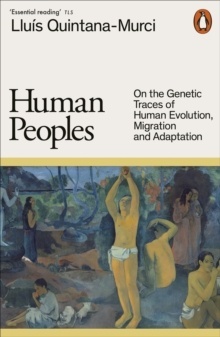Human Peoples
On the Genetic Traces of Human Evolution, Migration and Adaptation

Editorial Penguin Books Ltd
Fecha de edición octubre 2025 · Edición nº 1
Idioma inglés
EAN 9781802061383
288 páginas
Libro
encuadernado en tapa blanda
Dimensiones 129 mm x 198 mm
Resumen del libro
We are living through a revolution in knowledge. Over the past twenty years, genetics has shed light on the history of humanity in unprecedented ways.
It enables us to study an individual's genome, compare it with populations worldwide, and understand its place in human history. Here Lluís Quintana-Murci, one of the scientists at the forefront of this research reveals how population genetics is transforming our understanding of who we are. Thanks to numerous discoveries, we now know how Homo sapiens spread around the world: from their exit from Africa approximately 60,000 years ago to the recent settlement of the remote lands of Polynesia within the last millennia.
Population genetics has also shown that humans mixed with now-extinct species, including Neanderthals, enabling them to adapt to new environments and survive diseases. These cutting-edge genetic findings will shape our future too, offering the key to medicine tailored to individuals. But the greatest revelation of population genetics is that we are all mixed and the product of our ancestors' long odyssey of migrations and adaptations across the globe.
As Quintana-Murci explains, without diversity, without difference, there is no evolution. Filled with fascinating insights from the front line of research, Human Peoples is a pioneering guide to the ground-breaking science of our shared past.
Biografía del autor
Lluis Quintana-Murci es un biólogo y genetista franco-español de renombre mundial. Su especialidad es la genética de poblaciones y la historia demográfica de la evolución humana. Es profesor en el Collège de France, donde ocupa la cátedra de Genómica y Evolución Humana.<br> También es el director de la Unidad de Genética Evolutiva en el Instituto Pasteur. Su trabajo ha sido premiado con numerosas distinciones, incluidas las medallas de plata y bronce de la CNRS, así como premios de la Academia de las Ciencias. Además, ha sido galardonado por el Consejo de Investigación Europeo.<br> Es miembro de la Organización Europea de Biología Molecular, y en 2019 fue nombrado miembro de la Academia de las Ciencias.








